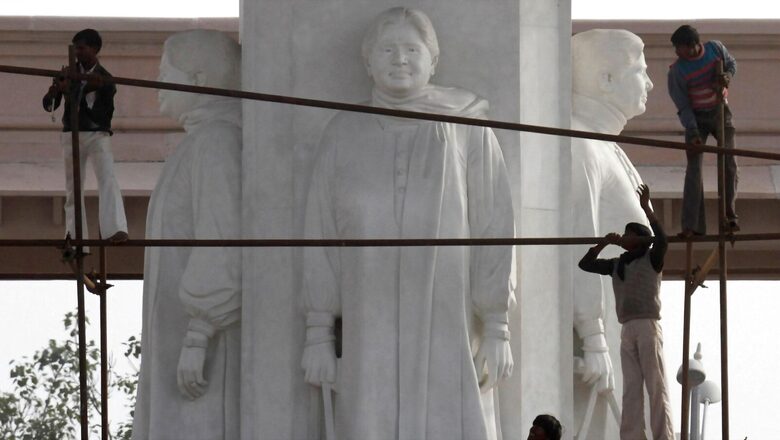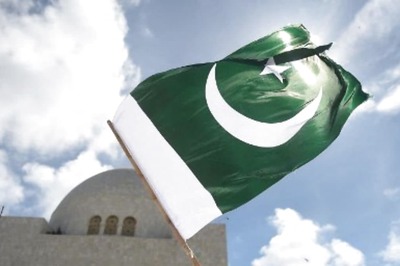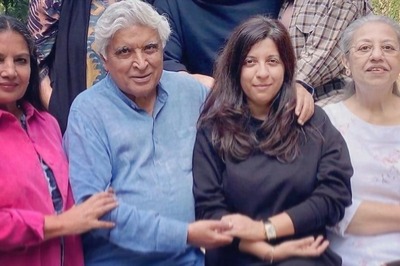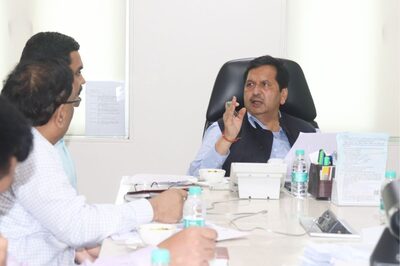
views
With just one seat to its name, Bahujan Samaj Party (BSP) has displayed its most dismal performance in Uttar Pradesh. Mayawati had claimed the party would form an ‘iron clad’ government in UP, and while the declaration seemed far-fetched to most at the time, the party’s performance has proved it downright contradictory.
Mayawati has served four separate terms as the Chief Minister of UP. But now, her party may be heading towards oblivion. The Dalit-centric party had a Brahmin as its most visible face in the 2022 assembly elections. With Mayawati making only a few appearances during the election campaign, BSP MP Satish Chandra Mishra, a Brahmin, was left to carry the campaign on his shoulders.
Kanshi Ram founded the BSP in 1984 to represent the Bahujan community, which refers to Scheduled Castes, Scheduled Tribes, and Other Backward Classes (OBC), as well as religious minorities. After 2012, Mayawati gradually promoted Mishra as the party’s new face while exiling or marginalising all Dalit leaders, according to political pundits. The BSP now has no second-tier leadership, and even the Jatavs, who had supported Mayawati throughout her politically turbulent years, appear to have deserted her.
Have Jatavs Deserted BSP?
Mayawati’s sub-caste, the Jatavs, have a 14% share of the scheduled caste population. The BSP has received only 12.9% of the vote, indicating that even Jatavs may have abandoned the party. The BSP could win only one seat in the state. In 2017, the BSP received 22.2% of the vote and 19 seats. This indicates that the party has lost nearly 10% of its vote share.
A former BSP MLA told IANS, “The party is on its way to complete disintegration. The signals were clear when the party moved away from Kanshi Ram’s ideology and began promoting Brahmin leaders – the same community that Kanshi Ram had warned us against. Mayawati has now started promoting her family in politics and this also goes against Kanshi Ram’s ideology. This is probably the BSP’s last election. The elephant has outlived its utility.”
Mayawati has previously used the Dalit-Muslim or Dalit-Muslim-Brahman formula, but it is no longer effective for her, as the Bharatiya Janata Party (BJP) broke down the non-Jatav voters in 2017, according to a report by India Today. The BSP received nearly 30% of the vote in the 2007 UP Legislative Assembly Elections, when the party won a majority. However, in 2012, it had dropped to 26%. Then, in 2017, this percentage fell to 22%, and in the 2019 Lok Sabha elections, the BSP received only 19.3 percent of the vote, with the majority of voters being Dalits.
Political analyst Sharad Pradhan had told India Today in an earlier report that “BSP chief’s self-centered ideology, a shift of major leaders, ineffective conventional approach and Twitter-based politics has badly affected the party’s image on the ground.”
Dr. Lalji Prasad Nirmal, Chairman of Ambedkar Mahasabha, had said in the report that the BSP could not provide security, shelter, and employment to the scheduled caste community during its rule.
“During her tenure, Mayawati did nothing to stop atrocities against Dalits and ignored the provisions of the Scheduled Castes and Tribes Prevention of Atrocities Act. The Dalit community is no longer affiliated with the BSP”, he had said.
The Elephant Keeps Changing Its Ways
Meanwhile, political pundits claim that the BSP’s contradictory stance during the campaign has nearly eliminated it from Uttar Pradesh’s political centre stage.
“She repeatedly issued statements that seemed supportive of the BJP and Amit Shah reciprocated when he testified BSP’s relevance in UP politics. Naturally, the anti-BJP vote moved away from BSP because they sensed a post poll alliance with the BJP. Moreover, the absence of Dalit leadership in the party made the Dalits search for greener pastures. Some went with BJP and some with SP,” senior political analyst Prof RK Dixit told IANS.
After the party’s dismal results, Mayawati said it was ‘rumours’ of the BSP being BJP’s ‘Team B’ that had resulted in Muslim voters choosing the Samajwadi party, instead. But Mayawati had earlier resonated with Shah’s statement that BSP is not losing relevance in UP.
Mayawati, who spoke to News18 after casting her vote in Lucknow, had agreed with Shah and said, “He is right in his assessment. Muslim samaj is already angry with the Samajwadi Party. Why will it vote for them? UP residents have rejected SP even before polling as voting for SP means gunda raj and mafia raj. We have already seen riots during SP regime. The face of Samajwadi Party leaders tell that they are not coming in power.”
Also, a majority of former BSP leaders have run on the SP ticket, bringing their own supporters with them. According to experts, the BSP will now have a negligible presence in the state assembly and will be unable to support or oppose the ruling BJP.
Bridges Burnt
Mayawati has already burnt bridges with the Congress and Samajwadi Party, with whom she had allied in 2019. While leading her subdued campaign in these elections, Mayawati shot repeated salvos at the Grand Old Party and Samajwadi Party.
In a recent statement, Mayawati has also said it was the fear of a ‘jungle raj’ if the Samajwadi Party came to power made its other supporters shift to the BJP.
Sources within the party, meanwhile, told IANS that the party president is no longer interested in electoral politics and is eyeing the post of President of India.
What Has Been Mayawati’s Reaction?
However, Mayawati said the results were a ‘lesson for us’. “UP election results are opposed to BSP’s expectations. We should not be discouraged by it. Instead, we should learn from it, introspect and carry forward our party movement, and come back to power,” Mayawati said.
BSP chief Mayawati, while addressing a press conference on Friday, urged party workers to not feel discouraged and promised a comeback in the future. Mayawati said that the party is going through a tough time, just like the BJP had gone through earlier.
“Before 2017, BJP did not have a good stake in Uttar Pradesh. Likewise, today, Congress is also undergoing the same phase as BJP…UP election result is a lesson for us to continue putting in efforts,” Mayawati said.
“The public voted for the BJP even though they were not happy with the party’s politics because they did not want the Samajwadi Party to come back to power,” Mayawati also said.
Promising a comeback in the future, Mayawati said, “In politics, you have these ups and downs. And party leaders have to encounter such changed circumstances and make changes accordingly to their present situation.”
Mayawati has also blamed the media for its “casteist agenda,” which she claimed hurt the party’s chances in the elections. Mayawati has stated that her party will boycott television debates. “The media’s work during the UP assembly elections to harm the Ambedkarite BSP movement by adopting casteist hatred and a hateful attitude toward their bosses is not hidden from anyone,” Mayawati said on Twitter.
Who Was the Lone BSP Candidate Who Won?
Only one of the northern state’s 403 assembly constituencies were won by the party. Uma Shankar Singh of the Rasara constituency was the lone BSP candidate to win on a BSP ticket. With 87,887 votes, Singh defeated his close rival Mahendra of the Suheldev Bharatiya Samaj Party – an ally of the Samajwadi Party (SP) in this year’s elections – and Babban of the Bharatiya Janata Party (BJP). Mahendra received 81,304 votes, while Babban received 24,235.
Singh is a contractor by trade and a well-known figure in the Ballia district, which includes the Rasara assembly constituency. He has won the Rasara seat for the third time, having previously won in the 2017 and 2012 assembly elections.
According to a report by Live Hindustan, Singh is well-known in Rasara for assisting the poor and giving out freebies. This includes everything from assisting the poor in their daughters’ weddings to their children’s education. He even provides free WiFi to the residents of Rasara.
Party Cadre in Other States Dissapointed Too
A report by the New Indian Express also claims that the BSP’s poor showing in Uttar Pradesh has surprised party leaders in Karnataka, raising concerns about the party’s prospects in the state. Dalits in the state, particularly those who have been associated with the Bahujan movement for the past 20 years, are disappointed following the party’s worst ever defeat in UP, the report mentions, adding that according to party insiders, many people may now consider switching allegiances unless the party can revitalise itself and groom the next generation of leaders.
With inputs from IANS
Read all the Latest Politics News and Breaking News here


















Comments
0 comment